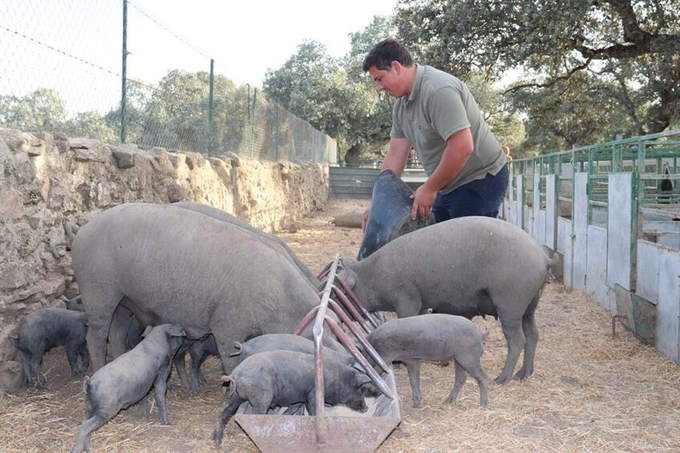November 27, 2025 | 06:51 GMT +7
November 27, 2025 | 06:51 GMT +7
Hotline: 0913.378.918
November 27, 2025 | 06:51 GMT +7
Hotline: 0913.378.918
Agricultural organisations have lobbied hard to get livestock farmers out of the regulations but the EP voted in large majority in favour of the revision of the so-called “Industrial Emission Directive” (IED).

Antonio Cano owns about 70 sows, and he’s finishing all piglets. The piglets are purebred Iberian pigs. - Photos: Rene Stevens
The new rules will make it mandatory to set the strictest achievable emission levels for the sectors covered. To combat water scarcity, environmental performance targets will become obligatory for water consumption. For waste, resource efficiency, energy efficiency and raw material use, targets will be within a range and for new techniques, they will be indicative.
The EP and the other legislators in the EU agreed to extend IED measures to pig farms with more than 350 livestock units (LSU), equivalent to some 1,100 adult pigs and 700 sows.
Farms are excluded if they are raising pigs in an extensive or organic manner, and outside for a significant amount of time in a year. The current directive from 2010 already was already covering pig farms with more than 2,000 pigs and 750 sows.
For poultry, the threshold remains unchanged at 280 LSU or 40,000 animals for rearing chickens for meat. For egg producers, the limit is lowered to 21,400 laying hens compared to 40,000 under the existing rules.
The EP decided earlier to leave cattle farms out of the new directive. However, the European Commission has to assess, by 31 December 2026, whether there is a need to further address the emissions from rearing livestock, including from cattle, and a reciprocity clause to ensure producers outside the EU meet requirements similar to EU rules when exporting to the EU.
Citizens in the whole of the EU can access data on all permits, including those from livestock farms, from a new EU Industrial Emissions Portal. Companies that do not comply can face penalties of at least 3% of the operator’s annual EU turnover for the most serious infringements. EU countries shall give citizens affected by non-compliance the right to claim compensation for damages to their health.
Bulgarian MEP Radan Kanev (on behalf of political party EPP), commented, “Today’s vote shows Parliament’s commitment to the zero pollution goals of the Green Deal and the health of Europeans. It also demonstrates that those goals can be achieved without placing an additional administrative burden on businesses and especially on European farmers. The vote emphasises that MEPs understand the reasons behind the farmers’ protests.”
The law now also has to be adopted by Council, before being published in the EU Official Journal and entering into force 20 days later. Member states will then have 22 months to comply with this directive.
The industrial emission directive is the main EU instrument regulating air, water and soil pollution from industrial installations including intensive livestock farms, which can lead to health problems such as asthma, bronchitis and cancer, the European Parliament further explains. It also regulates generation of waste, use of raw materials, energy efficiency, noise and prevention of accidents.
(PP)

(VAN) A new study reveals how the simultaneous effects of ocean acidification, salinity and loss of oxygen are making the world more fragile.

(VAN) Hopes are growing that the creation of the first 3D turkey gut model could be a turning point in the battle against the virulent blackhead disease.

(VAN) Tyson, America’s biggest meat supplier, plans to shutter one of its largest beef processing plants as the industry continues to struggle with low cattle supplies and political pressure from Washington.

(VAN) New FAO study shows how digital solutions are empowering farmers and fishers to prevent losses and build resilient agrifood systems.

(VAN) Brazil's COP30 presidency pushed through a compromise climate deal on Saturday that would boost finance for poor nations coping with global warming but that omitted any mention of the fossil fuels driving it.

(VAN) Poultry farmers in the UK have been warned that they could face one of the worst winters yet for bird flu.

(VAN) Prices of main-crop paddy have risen sharply, with jasmine rice hitting 16,100 baht per tonne — the highest level in years.